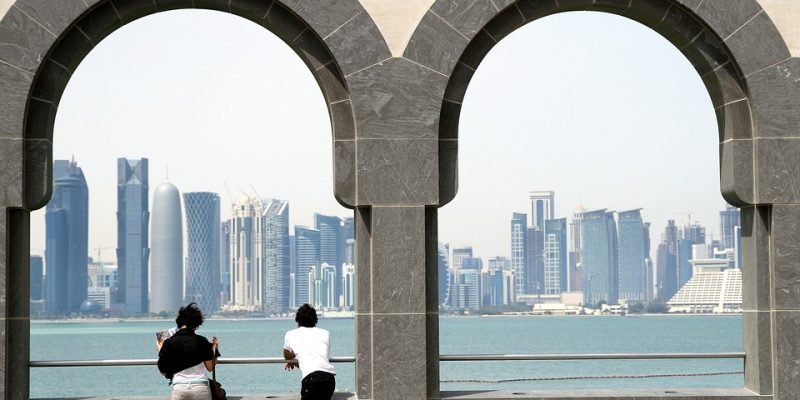At the time this was written, Lagos was an ‘overcrowded’ city of some five million people. Since then, Ikoyi and Victoria Island have been supplanted by Banana Island as the ultra-exclusive enclave of the rich and famous. Add the whole Lekki strap of real estate and it becomes a tale of three or perhaps four cities. And oh… Maroko the old has long since been wiped out the map. Nowadays, the divide has deepened and the contrasts laid bare in even sharper relief. Cue in the post #EndSars civil unrest. Enjoy
I should think everybody knows where Ikoyi and the Victoria Island are both situated in Lagos State.
They are at furthermost reaches of the Lagos Island, and they both terminate before the Atlantic Ocean, with a lagoon separating them.
Between them, they house the crème de la crème of the Lagos— no, Nigerian high society. Also, especially in Victoria Island, there are numerous Embassies and High Commissions. They also have the best hotels in town, (or should I say, the most expensive) the most exclusive clubs, and easily one of the best laid out networks of roads in Lagos.
In the colonial times, Ikoyi used to be the so-called European Quarters, housing the numerous white colonial officers that were based here in Nigeria, propagating Her Majesty’s imperialism.
Nowadays, top-level Government Officials have taken over almost all of the distinctly “colonial-style” houses, with their enormous gardens, that constitute old Ikoyi.
Victoria Island is not as old a settlement as Ikoyi, but it’s just as important. It is the haunt of the second breed of colonialists. No, neo-colonialists? No, expatriates and a new generation of nouveau riche Nigerians who struck oil. Like Ikoyi, Victoria Island houses a lot of Government officials and their offices, including the N.T.A. station and the Nigerian Mint.
With its sprawling boulevards, modern blocks of flats, beautifully architected houses, and relatively well-maintained streets and drains, Victoria Island, I should think, looks like a run-down Abuja.
And with its house rentals sometimes running into six digits, only the very rich, or the very powerful, can afford to stay there. The whole area is serene with plenty of exotic and expensive cars sedately cruising along or parked in the driveways of impressive-looking mansions. And if you peek more closely, you would almost certainly see some skimpily-clad beauty luxuriating in one of the numerous swimming pools that each house seems to have.
Ikoyi and Victoria Island seem so detached, untouched by the mayhem of Lagos Mainland. Where else would you see expatriates taking their dogs or their little children in push-carriages for a walk? Or the odd jogger huffing and puffing his way through mild traffic and tarred roads.
Here, in this blissful haven, everything works — the phones work, there is running water from the tap (it doesn’t matter if it’s from your own private and treated water borehole), and there is electricity, (even if it’s from your own sound-proofed generator). The important thing is that it is there.
Residency in Ikoyi and Victoria Island are, for a lot of people, the final seal of “having arrived” —the ultimate status symbol. And, oh! I almost forgot! Our dear legislature— no, as a matter of fact, all top-level government officials reside permanently there too, or at least have a well-furnished “dacha” on standby.
And the enormous, impressive, and terribly expensive One Thousand and Four (1004) Flats, near the Law School, is where I believe our dear officials and their favoured girlfriends reside.
I was lucky to be allowed into one; they are expensively furnished, with rugs that tickle your ankles, settees that are simply heavenly, and other tasteful furnishings that turn the place into a mini-paradise.
And I hear that they change them every, year; and not wanting to bother themselves with the problem of properly disposing of the old ones, they simply chuck them out the window, where they all collect in one impressively huge and shattered pile of once-expensive furniture, all paid for, of course, by the taxpayer.
Barely 2km behind these huge blocks of flats is a sand-filled plateau, rightly called ‘sand-fill’. And here, there is a market where residents, officials’ wives and girlfriends shop.
Zooming in and out in their big flashy cars, and flashing so much Naira. This place, also called Lekki, houses the offices of the Eti-Osa Local Government Area. It is also a motor-park for venerable Land Rovers, and other four-wheel-drive vehicles. It sits at the beginning of the other forgotten city called Maroko.
Maroko, in one of those ironic twists of life, is sandwiched between the affluent Victoria Island, and across the Lagoon, the prosperous Ikoyi. Built on reclaimed land (originally as a sea-breaker for Victoria Island), Maroko cannot strictly be called a city, because it’s one huge ghetto, with a capital G!
The journey into Maroko starts in one of those ageing, colonial vintage Land Rovers. They are old, rickety, but reliable, and serve as the only means of crossing the vast undulating dunes en-route to Maroko proper. For in Maroko, there are no roads, just ridges ploughed deep into beach sand by Land rovers plying well-worn routes.
Everywhere you look, you see squalor.
Huge slimy green lakes punctuate the so-called streets. And a journey in a Land Rover wading through one of these lakes is a whole new adventure. You have to raise your legs high up, to save them from the brackish water that inevitably oozes in.
Hundreds of ram-shackled and flooded shanties are scattered crazily everywhere. And the handful of concrete buildings all has a sickly green topcoat of some fungal growth. Aquatic plants all but submerge many of the houses, and since there is no drainage what so ever, with any slight rain, water collects, and everywhere is flooded.
Residents affectedly fjord veritable rivers to get into their own homes and small children sit in murky knee-high water, hunting tadpoles, and having a splashing time.
Rickety and very unsafe wooden bridges dot the whole dismal landscape, serving as the only means of crossing the deeper lakes. And because there is no water disposal facility, huge rubbish dumps float unattended in huge lakes.
This is the nightmare called Maroko… no water, no light, no roads, and millions of hungry mosquitoes. Something should be done- anything! The residents feel betrayed by the Lagos State Government who took their votes, pocketed them, and did nothing.
An epidemic is imminent, but do we have to wait until it happens?
Somebody dryly suggested that we turn Maroko into a tourist attraction… a bizarre juxtaposition of the filthy rich and the wretchedly poor; the beautiful houses and the rusted shanties; affluence and effluence… and unreal and unnatural coexistence of two extremes in a miserable tale of two cities.
The Punch,
Saturday, July 3, 1982



